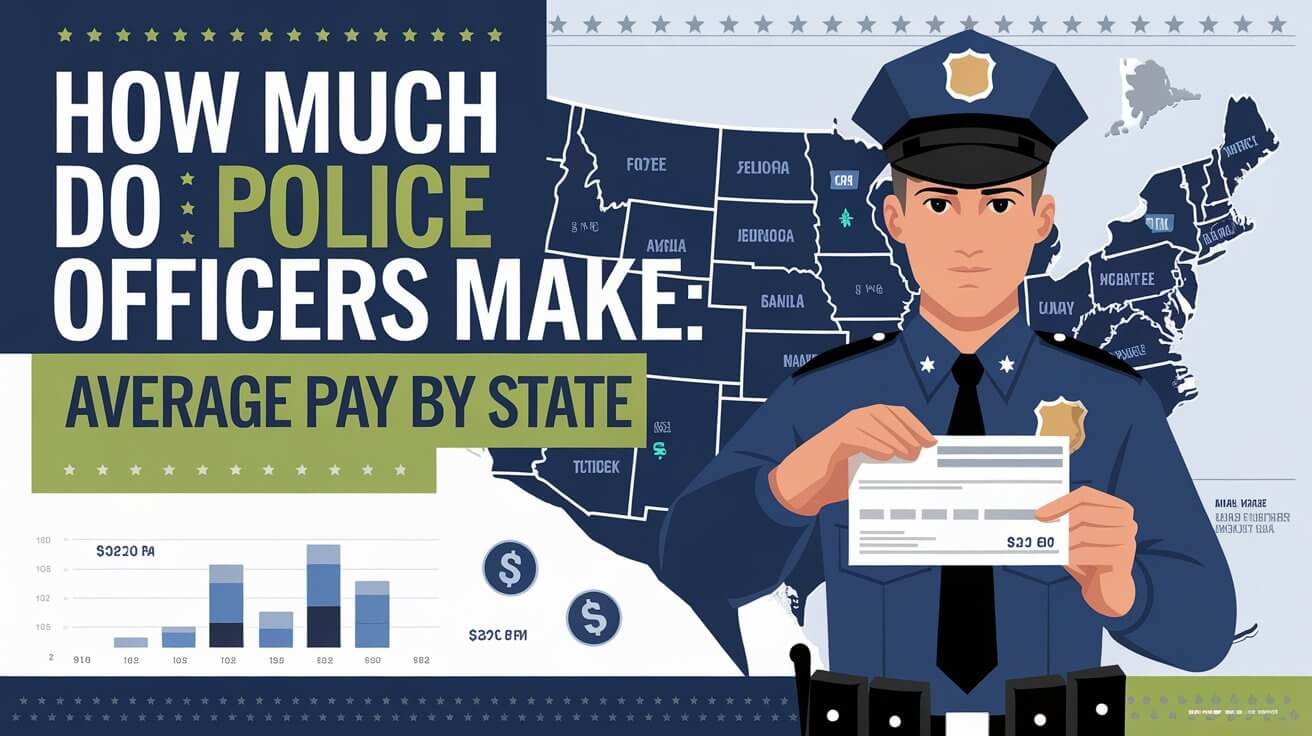How Much Do Police Officers Make: Average Pay by State

Police officers are the heart of our communities, keeping us safe and enforcing the law. But have you ever thought about their salaries? In this article, we’ll explore how much they earn and what affects their pay. We’ll also look at the salary ranges in different areas.
Average Police Officer Salary in the United States
The median annual salary for police officers in the U.S. is $72,280. Salaries can range from $45,200 to $111,700 a year. Experience, location, and specialty jobs can affect how much an officer earns.
Base Salary Range
Police salaries vary based on rank, years of service, and local cost of living. New officers start with lower salaries. Experienced and higher-ranking officers earn more.
Overtime and Additional Pay
Police officers get overtime pay, usually at time and a half for extra hours. They also get bonuses and other extra pay. This increases their total earnings.
Annual Earnings by Experience Level
As police officers gain experience and move up in rank, their pay goes up. New officers see pay increases early on. Promotions to detective, sergeant, or lieutenant lead to bigger salary jumps.
Top-Paying States for Law Enforcement Officers
Some states lead the way in paying police officers well. The latest figures show the highest-paying states for police salaries in the U.S. are:
- California ($111,770)
- Washington ($98,070)
- Alaska ($94,660)
- New Jersey ($94,070)
- Hawaii ($89,850)
These states often have a higher cost of living. This means law enforcement agencies can offer better pay to keep officers. Other states like Illinois, Oregon, and Delaware also pay police officers well.
Police and sheriff’s officers in 2022 made about $3,400 more than high school teachers. They also earned over $10,000 more than firefighters and postal workers. This shows how much society values their work and the importance of their role in keeping us safe.
| State | Median Police Officer Salary (2022) |
|---|---|
| California | $111,770 |
| Washington | $98,070 |
| Alaska | $94,660 |
| New Jersey | $94,070 |
| Hawaii | $89,850 |
These states show the high demand for skilled law enforcement officers. They offer insights into the competitive market for attracting and keeping top talent in law enforcement across the country.
How Much Do Police Officers Make: Salary Breakdown by Region
Police officer salaries vary a lot across the United States. It’s key for those interested in law enforcement to understand these differences.
West Coast Police Salaries
On the West Coast, like California, Washington, and Oregon, police make more money. In California, the average salary is $105,220. Washington and Oregon average around $92,070 and $84,600, respectively. These high wages help keep up with the cost of living in these areas.
East Coast Police Wages
The East Coast, mainly the Northeast, also offers good pay for police. In New York, officers earn about $92,660 a year. Massachusetts pays around $83,180. But, the cost of living here is high, which can reduce how far these salaries go.
Midwest Law Enforcement Pay
The Midwest has a range of police salaries. Minnesota and Illinois pay more, with Minnesota at $79,300 and Illinois at $75,720. But, states like Indiana and Ohio pay less, from $55,000 to $60,000 a year.
Remember, these are just averages. Salaries can change based on experience, training, and where you live.
Police Salary Comparison in Major Metropolitan Areas
Major cities usually pay their police more than other places. This is because living costs are higher in these busy cities. Cities like New York City, Chicago, Washington D.C., Los Angeles, and Miami pay their officers well.
In places like California’s Sunnyvale, San Jose, and Santa Clara, police make $131,090 a year. San Francisco, Oakland, and Hayward follow with $122,570. But, some areas in California, Hawaii, and Alaska pay less, from $79,230 to $93,570.
| Metropolitan Area | Mean Annual Salary |
|---|---|
| Sunnyvale, San Jose, Santa Clara, CA | $131,090 |
| San Francisco, Oakland, Hayward, CA | $122,570 |
| Aguadilla-Isabela, PR | $18,980 |
| Guayama, PR | $21,370 |
| Non-metropolitan areas in CA, HI, AK | $79,230 – $93,570 |
The big difference in police salaries shows how living costs affect pay. Cities with high costs of living often pay more to keep good officers.
Career Advancement and Salary Growth in Law Enforcement
As you move up in law enforcement, your salary can grow a lot. Starting as a police officer and moving up to leadership roles can mean big pay increases. Knowing how to advance in your career is key for those who want to earn more.
Rank-Based Pay Increases
Law enforcement careers often involve moving from police officer to higher ranks. These include deputy sheriff, corporal, sergeant, lieutenant, captain, and chief of police or sheriff. Each promotion comes with more responsibility and a higher salary. Officers with many years of experience can earn up to 50% more than new ones.
Education Impact on Earnings
Pursuing higher education is essential for advancing in a law enforcement career. Degrees in criminal justice can really help your salary. Many departments give pay raises to officers with college degrees.
Specialty Positions and Higher Pay
Jobs like detectives and forensic analysts usually pay more than regular police work. Getting special skills and certifications can help you get these better-paying jobs.
| Rank | Median Annual Salary |
|---|---|
| Police Officer | $67,290 |
| Sergeant | $87,050 |
| Lieutenant | $105,230 |
| Captain | $121,950 |
| Chief of Police | $146,830 |
“Preparation for promotional examinations and assessments through study guides, preparatory courses, and practice tests is vital for enhancing knowledge and skills and increasing an officer’s chances of career advancement.”
Entry-Level Police Officer Salaries
The starting pay for new police officers varies a lot in the United States. Some departments only need a high school diploma, while others require more education. Even with less education, rookie cop salaries start low but grow quickly in the first few years.
In Philadelphia, the starting salary for a Police Officer Recruit is $64,982 a year. After graduating, the salary jumps to $69,492. The department plans to increase pay, reaching up to $93,888 for more experienced officers.
At the Miami-Dade Police Department, entry-level officers earn between $58,451.90 and $103,204.92 a year. Those with experience can get a higher salary based on their background.
Though the initial pay might seem low, law enforcement offers great benefits and chances for growth. Departments provide health insurance, retirement plans, and paid vacation. These benefits help balance out the lower starting police pay and rookie cop salary.
Benefits and Compensation Packages for Police Officers
Police officers play a crucial role in keeping our communities safe. Their pay packages show how much their work is valued. They get more than just a salary; they also receive benefits for their health, retirement, and other needs.
Health and Insurance Benefits
Police officers have great health insurance. This includes medical, dental, and vision plans. They also get life insurance to protect their families. Plus, they have paid sick leave and disability benefits for their health.
Retirement Plans and Pensions
Planning for retirement is key for police officers. Many agencies offer pension plans and 401(k) options. These help officers secure their financial future after a career of public service.
In Philadelphia, police start at $64,982 and go up to $69,492 after the Police Academy. The highest salary is $93,888. They also get dental and prescription plans and 15 sick leave days a year.
In Atlanta, starting pay is $60,987, rising to $66,395 for those with experience. Officers contribute 8% to a pension plan and have a 401A account with a 7.5% total contribution.
The benefits and pay packages for police officers show their value. They are key to keeping our communities safe and prosperous.
States with Lower Police Officer Salaries
In the United States, the average police officer makes $76,550 a year. But some states pay their officers much less. These states are mostly in the South, where living costs are lower but public service budgets are tight.
The five states with the lowest police salaries are Mississippi ($42,900), Arkansas ($46,880), Kentucky ($47,560), West Virginia ($48,570), and Tennessee ($49,250). Other states with lower wages include Louisiana ($49,340), Oklahoma ($50,250), and South Carolina ($52,180).
These low-paying police states struggle to keep good officers. The below-average law enforcement wages make it hard for officers to support their families. It’s clear that fair funding and pay are needed to ensure all communities have quality law enforcement.
Salary Differences Between Local and State Police
Police officer salaries can differ based on the agency they work for. Local or state police have similar duties but pay varies. This is true even in the same state.
State troopers usually earn more than local police. This is due to state police’s bigger budgets and specialized training. State agencies also have broader duties.
| Position | Average Salary |
|---|---|
| Local Police Officer (Entry-Level) | $60,987 per year |
| State Trooper (Entry-Level) | $66,395 per year |
But, not all states follow this pattern. Local police might offer higher salaries or better benefits. This makes them competitive in hiring and keeping officers. The local vs state police pay and police department salary variations depend on many factors. These include the cost of living, union deals, and law enforcement budgets.
The salary differences between local and state police can be complex. They depend on the location and agency. Prospective officers should look into both local and state police salaries and benefits. This helps them choose the right path in law enforcement.
Law Enforcement Specialty Positions and Their Pay Scales
In law enforcement, specialized roles often mean higher pay. Detectives and criminal investigators, for example, make about $49,540 a year. These jobs require top skills and knowledge, making them attractive to many officers.
Computer analysts are among the highest earners, making up to $103,800 a year. They use their tech skills to fight cyber crimes and help with digital forensic work. SWAT team members, K-9 officers, and narcotics detectives also get extra pay for their risky jobs.
The salaries for these special roles vary based on experience, education, and job duties. But, it’s clear that those who take on these challenges can earn more and find more rewarding careers in law enforcement.
| Specialized Police Role | Median Annual Salary |
|---|---|
| Detectives and Criminal Investigators | $49,540 |
| Computer Analysts | Up to $103,800 |
| SWAT Team Members | Varies with Hazard Pay |
| K-9 Officers | Varies with Hazard Pay |
| Narcotics Detectives | Varies with Hazard Pay |
The data shows that specialized police roles can lead to higher earnings. This reflects the extra responsibilities and unique skills needed for these jobs. By getting specialized training and taking on tough assignments, law enforcement officers can grow their careers and increase their earnings.
Police Chief and Senior Leadership Compensation
Police chiefs and senior leaders in law enforcement get some of the highest pay. In the U.S., police chiefs make a median of $99,330 a year. This shows the big responsibility and experience needed for these jobs.
Deputy chiefs, commanders, and captains also get paid more than regular officers. Their pay depends on their education, special tasks, and how long they’ve worked.
Police executives can earn a lot, with some chiefs making over $400,000 a year. For example, the former Los Angeles County Sheriff, Jim McDonnell, was set to make $450,000 as the LAPD chief. This is more than the LA County sheriff’s salary of $397,340.
This shows how salaries for top law enforcement jobs are increasing. It’s to attract and keep experienced leaders, mainly in big cities.
Police chief salaries differ by area, but the median is $120,700 on the West Coast. With benefits like health insurance, retirement plans, and vacation, their total pay can be about $164,539 a year. This high pay is needed to find and keep skilled leaders for big police agencies.
Most-Asked Questions
How much do police officers make?
Police officers and sheriff’s patrol officers earn a median of $72,280 a year. Their salaries range from $45,200 to $111,700. Several factors influence their pay, including where they work, their experience, their specialty, and their qualifications.
What is the average salary for a police officer in California?
In California, police officers make about $100,330 a year on average. Their salaries start at $64,610 and can reach up to $128,300.
What are the top-paying states for police officers?
The highest-paying states for police officers are California, Washington, Alaska, New Jersey, and Hawaii. Illinois, Oregon, and Delaware are also among the top-paying states.
How do police salaries differ across different regions?
West Coast states like California, Washington, and Oregon have some of the highest police salaries. The East Coast, mainly the Northeast, also offers competitive wages. In the Midwest, Minnesota and Illinois have higher salaries than other states. Southern states generally have lower average salaries for law enforcement officers.
How do police salaries compare in major metropolitan areas?
Major cities like New York City, Chicago, Washington D.C., Los Angeles, and Miami offer higher salaries. This is because the cost of living is higher in these areas.
How does career advancement affect police officer salaries?
Advancing in your career in law enforcement can lead to higher salaries. Roles like sergeant, lieutenant, and captain require more experience and education, leading to better pay. Some departments offer extra pay for college degrees. Specialized roles, like detectives, also earn more than regular patrol officers.
What are the entry-level police officer salaries?
Entry-level police officer salaries vary by location and department. Some require only a high school diploma, while others need an associate’s or bachelor’s degree. Starting salaries are lower but increase quickly in the first few years.
What benefits do police officers receive?
Police officers get comprehensive benefits, including health and life insurance, paid vacation and sick leave. Many departments offer retirement plans like 401(k) or pensions. They may also get funds for education, uniform allowances, and hazard pay for certain duties.
Which states have the lowest average police officer salaries?
The lowest average salaries for law enforcement are in the South. Mississippi, Arkansas, Kentucky, West Virginia, and Tennessee are the five lowest-paying states.
How do local and state police officer salaries compare?
Salaries vary between local and state police departments, even in the same state. Factors include department size, local cost of living, and union negotiations. In some states, state troopers earn more than local police, while in others, it’s the reverse.
What are the highest-paying law enforcement specialty positions?
Specialty positions in law enforcement often have higher pay. Detectives and criminal investigators earn a median of $49,540. Computer analysts can earn up to $103,800 annually. SWAT team members, K-9 officers, and narcotics detectives may also get extra pay.
How much do police chiefs and senior leadership earn?
Police chiefs and sheriffs earn the highest salaries, with a median of $99,330 a year. Senior leadership roles like deputy chiefs, commanders, and captains also have higher salaries. These positions require advanced degrees and a lot of experience in law enforcement.






